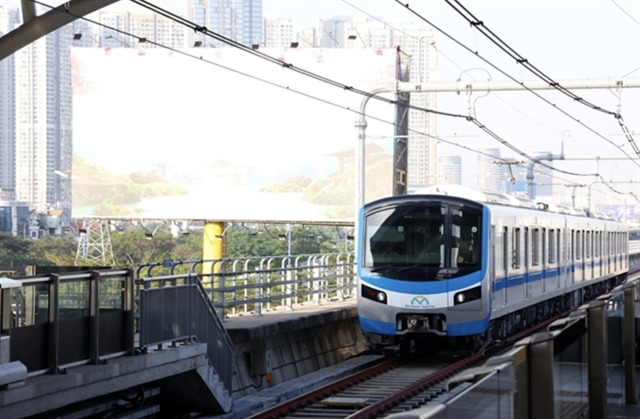 Society
Society

 |
| Metro line No. 1 in HCM City. The HCM City targets to complete its metro system within the next decade, according to Chairman of the HCM City People’s Committee Nguyễn Văn Được. VNA/VNS Photo |
HCM City — Chairman of the HCM City People’s Committee Nguyễn Văn Được pledged that the city will finish investing in its urban rail (metro) system within the next decade.
He made the statement at a meeting during the 2025–2030 Party Congress on October 14.
In his remarks, the Chairman acknowledged the persistent challenges of traffic congestion, flooding, and environmental pollution facing the city. He stated that the plan is not a simple addition of merged territories but a coordinated unification across the expanded regions of HCM City, Bình Dương, and Bà Rịa – Vũng Tàu.
He urged local authorities to discard parochial thinking and instead work in solidarity to achieve the far-reaching goals ahead. A core focus will be on outer ring roads (Rings 2, 3, and 4) and improving connectivity from the central urban area to national highways and neighbouring provinces.
On the metro front, he noted that several major investors — including Vingroup, Vietjet, and Becamex — have already expressed interest in participating in certain lines. He reaffirmed: “Within 10 years, we will complete the urban rail network.”
Also at the meeting, Trần Quang Lâm, Director of the HCM City Department of Construction, revealed that following the municipal expansion, the city now has approximately 80 flood-prone spots — up from fewer than 20 prior to the merger.
To realise the ambitious infrastructure agenda, Lâm estimates that over the next five years, HCM City will require more than VNĐ7 trillion (nearly $265.7 million), yet the city can only mobilize about VNĐ1 trillion through existing channels.
He emphasised that the city’s comparative advantage in land resources, the enabling legal framework for public-private partnerships (such as BT contracts), and the ability to issue bonds will be critical. However, success will hinge on having adequate human capital, technical experts, and project management capacity.
Because of limits in civil service hiring policies, Lâm expressed concern that recruiting top advisory talent — especially in specialised sectors like rail transport — is difficult.
Meanwhile, Bùi Tá Hoàng Vũ, Director of the HCM City Department of Industry and Trade, commented that the expanded city has many of the ingredients needed to become a Southeast Asian hub in advanced industry, technology, logistics, and transportation. He suggested prioritising sources such as ODA, government bonds, and strategic investments in ports, airports, and cross-region connectivity projects.
Vũ further urged central authorities to grant HCM City some special mechanisms, for example, simplifying “one-stop shop” services in industrial, export, tech, and innovation zones, thus making it easier for investors to engage in large-scale transport and infrastructure projects. VNS




